Eating
People often send us questions for our Dietitians Unplugged podcast. We love getting questions and once in a while we’ll pick one to answer in our show. This one in particular was one we felt was probably on the minds of many people for whom our philosophy was a completely new concept.
Our listener wrote:
I just listened to Dietitians Unplugged episode about Tess Holiday. Can you explain to me your feelings around obesity in a little more context. I am confused with what you actually promote around being very overweight. I do understand intuitive eating. And let me note, I’m not commenting on Tess Holiday specifically or her being on a cover of a magazine. I’m talking about obesity in general. In your opinion obesity is not bad? How can you support that opinion if obesity is linked to an endless number of medical conditions? I see how one can be overweight but still healthy. Just as someone can be skinny and unhealthy. But at a certain point in time, if you are so over weight that you are declared obese then you have fat crushing your major organisms, you are shortening your life, and setting yourself up for a difficult aging processes. How can someone with that amount of excess weight still “healthy.” Thank you for reading, your inquisitive listener.
We decided to answer these questions in a podcast episode! You can check that out here:
Start your path to normal eating with my free guide, 5 Strategies to Stop Overeating
Eating
Many of you have heard this word before: orthorexia. But what is it?
While not an official eating disorder listed in the DSM V, orthorexia is a growing concern in the ED world. The NEDA website tells us,
The term ‘orthorexia’ was coined in 1998 and means an obsession with proper or ‘healthful’ eating. Although being aware of and concerned with the nutritional quality of the food you eat isn’t a problem in and of itself, people with orthorexia become so fixated on so-called ‘healthy eating’ that they actually damage their own well-being.” However, since there is no official diagnostic criteria, it can be very hard to recognize. It’s kind of a “I know it when I see it” situation, which isn’t great for those who suffer from it, because it means many people are probably getting overlooked.
I have orthorexic clients, and they’ve sought help because their “healthy” food choices are starting to ruin their lives. They have anxiety at the thought of eating anything outside their rigid “clean eating” food rules. It’s beyond “healthy eating” and making choices that meet both satisfaction and nutrition needs. It’s an obsession, and sometimes becomes a full-time job.
Aaron and I decided to tackle the topic on our Dietitians Unplugged podcast when he found a blog post that felt dismissive of the issue. If you are wondering if your eating might qualify as orthorexia, give this podcast a listen, and if you think you need it because your life is not your own anymore, reach out to a professional for help.
Show notes
Read the blog that inspired this episode
Start your path to normal eating with my free guide, 5 Strategies to Stop Overeating
Eating
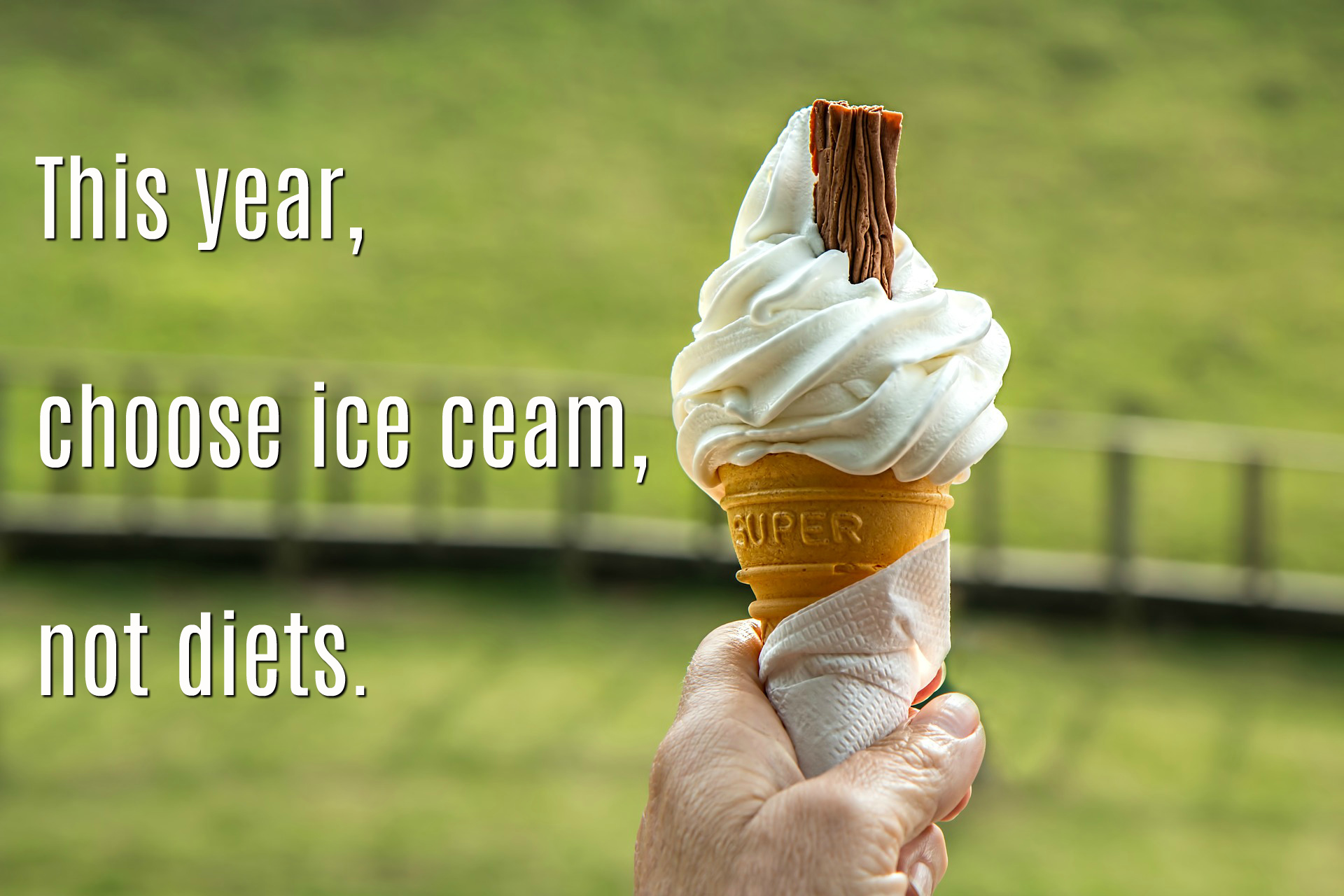
I wish I didn’t still have to say it, but the reality is that the diet industry still exists, people still feel bad about their bodies, weight loss is still the go-to medical intervention for people in fat bodies, and harm is still being done.
So I will say it loud and clear again for the new year: WEIGHT LOSS DIETS DON’T WORK.
Or to be perfectly accurate, they may work for a while, but all the available evidence points to the fact that over the long run, they DON’T work — the weight people lose is regained within three to five years. The science could not be clearer on this.
Looking at it another way — the Center for Disease Control and Prevention’s National Center for Health Statistics reports that nearly half of American adults are trying to lose weight at any given time, yet the statistics for “overweight” and “obesity” remain static at about 1 in 3 adults for each category. I’ve been hearing these numbers for years…so if our massive dieting efforts aren’t changing them, then that tells us something.
It tells us that trying to permanently lose weight is about as futile as trying to permanently change your height. But the weight loss industry continues to take people’s money and then blame them when their product doesn’t work.
So for the new year, my friend and Dietitians Unplugged podcast co-host, Aaron, and I decided to talk about why dieting doesn’t work. This is a great place to start for anyone new to our podcast, and hopefully our long-time die-hard listeners will appreciate the reminder of why they, too, are trying a different path to health.
Show notes:
12 Reasons to Ditch the Diet Mentality on Huffington Post
Subscribe and get my free guide:
Why you overeat …and what to do about it
Click here if you just want my newsletter!
Eating
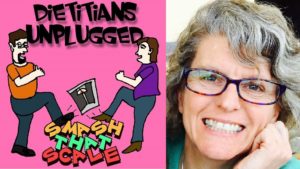
As many of you know, this past year I delved into the realm of care for diabetes.
Many people contact me looking for help with normalizing their eating, and I’ve noticed that folks struggling with blood sugar abnormalities often feel that a non-diet way of eating does not include them. They’ve been told by doctors or other health care professionals that they must focus on restriction and weight loss to improve their labs and health.
This could not be further from the truth. I have seen it with my clients who struggle from both disordered eating and diabetes or pre-diabetes. I have seen that helping them normalize eating patterns without a focus on restriction (in fact I emphasize including all the foods a person loves including sweets) or weight has improved their blood sugars, not to mention their quality of life.
That’s why I I was so excited to so a podcast earlier this year with Megrette Fletcher, MEd, RD, CDE. Megrette is a certified diabetes educator who provides non-weight-focused education for people with diabetes and pre-diabetes, and teaches other professionals how to provide this care as well. Founder of the Center for Mindful Eating, Megrette advocates for pleasurable, mindful eating and shame reduction to help manage blood sugars instead of restriction and weight loss. She is so generous with her knowledge, and truly someone I consider a mentor.
In this episode, she gives us a handy metaphor for understanding how our insulin works (the Insulin Knife!) and how we can best help our own bodies utilize its insulin. For those who have been scared by or felt shame for a diagnosis or family history of diabetes, we think you’ll find this episode extremely helpful in helping you get your self-compassionate self-care on.
Also available in iTunes and Stitcher.
Show notes:
Diabetes Counseling and Education Activities (for Professionals)
Eat What you Love, Love What You Eat with Diabetes 2017 Edition – most recent edition
Subscribe and get my free guide
Why you overeat …and what to do about it.
Click here if you just want my newsletter!
Eating
Dietitians Unplugged Episode 37 – Aaron and Glenys Tackle Their Inner Critics
We all have an inner critic. I don’t know anyone who doesn’t. It’s the voice that’s try to keep us safe by avoiding unnecessary risk.
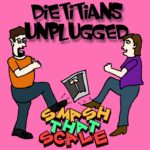
So, yes, sometimes that little voice can be really helpful in keeping us safe…but sometimes it can hold us back by sending damaging and unhelpful thoughts.
In this Dietitians Unplugged podcast episode, Aaron and I talked about our own inner critics, how they manifest, and how we deal with them. This is a truly unplugged (and sometimes unhinged!) discussion that we’re sure you’ll enjoy and hopefully will give you a few more tools for your self-care toolbox.
Dietitians Unplugged Episode 38 – ED Treatment for Marginalized People with Gloria Lucas
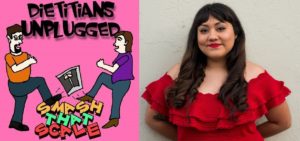
In this fabulous episode, Aaron and I were thrilled to welcome to the podcast Gloria Lucas, founder of Nalgona Positivity Pride (NPP). I got to see Gloria speak a few years ago at the 2016 BEDA conference on the role of colonialism in historical trauma and we’ve been excited to have her on ever since then.
Gloria shared her story of how and why she came to found NPP, which helps to provide eating disorder resources to marginalized people. She also talked about how eating disorder communities must learn to do better to include people of color into the discussion and make treatment more available and inclusive of marginalized people.
Links:
Nalgona Positivity Pride Etsy Store
Dietitians Unplugged Episode 39 – Is Sugar Addiction a Real Thing? with Tiffany Haug

Ever wonder if you’re addicted to sugar? Or some other kind of food? Aaron and I talked to Tiffany Haug, MS, RD, EDOC, who broke down the science of addiction for us, and explains why your diet history makes all the difference in how you approach highly palatable foods. Tiffany also talked about the problem with how food addiction is studied and the problems with the Yale Food Addiction Scale.
Subscribe and get my free guide:
Why you overeat …and what to do about it
Click here if you just want my newsletter!
Eating
Dietitians Unplugged Podcast Episode 34: Healthism vs. Self-Care with Lucy Aphramor
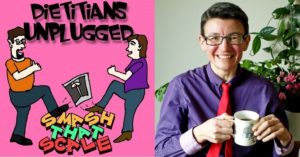
I’ve been a little remiss in the last few months about updating this blog with our latest Dietitians Unplugged podcast episodes. I have been crazy busy this past year – in reality, too busy, because I was trying to do way too much.
It took it’s toll. I had to find ways to triage everything in my life. That meant I had to pick between writing, which I really enjoy, and doing the podcast, which I really love too. It even meant I had to let go of things like updating this blog with the podcast, which pricked at me frequently but also was just something I didn’t have room for.
I termed this self-care. No one can do everything all the time. Some things have to go by the wayside. Until something gave way in my schedule (which it finally did) I decided to only do the very most important things in my life — that was spending time with my partner, going to my job, caring for my clients, podcasting and resting.
The topic of self-care makes a great introduction to this podcast we did back in February about the necessity of self-care, and how “healthlism” — the belief that health is our sole responsibility, and even obligation, and is not affected by our economic status, race, environment, sex, etc. — isn’t really making us healthy in any meaningful way.
UK-based radical dietitian Lucy Aphramor guided us through this topic with her usual eloquence (no surprise that she’s also a poet). As a radical dietitian, she focuses on the deep roots of what causes judgement, war and shame.
Dietitians Unplugged Episode 35 – Metaphors & Storytelling in healing Eating Disorders with Dr. Anita Johnston
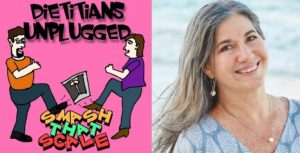
Eating in the Light of the Moon by Dr. Anita Johnson, eating disorder psychologist and storyteller, is one of the seminal works on eating disorders and one of the books that people tell me first helped them in their recovery from EDs and diet culture. We were so thrilled to have Dr. Johnson on our show and talk about how story-telling can be integral to our healing.
In addition to authoring this amazing book, Dr. Johnson is co-creator of the Light of the Moon Cafe, a series of online interactive courses and women’s support circles, and Soul Hunger workshops. She is currently the Clinical Director of Ai Pono Hawaii eating disorder programs with out-patient programs on Oahu and the Big Island of Hawaii, and an ocean-front residential program on Maui.
She also gifted our listeners with this handy guide to help discover the meaning behind your food cravings or phobias.
Dietitians Unplugged Episode Episode 36 – You are More than Your Body with Summer Innanen

One of my absolute favorite people in the body positive, anti-diet world is Summer Innanen. She has a genuine, no BS way about her that I just can’t resist. And it’s not just because we’re both Canadian, I swear!
Summer is a professionally trained coach specializing in body image, self-worth, and confidence. She helps women all over the world through her private and group coaching to break out of the diet culture cage and cultivate their inner, rampant untameability so they can wear, say and do what they want. She is the best-selling author of Body Image Remix, creator of the You, On Fire online program, and host of Fearless Rebelle Radio, a podcast dedicated to anti-dieting, body positivity, and feminism.
Subscribe and get my free guide:
Why you overeat …and what to do about it
Click here if you just want my newsletter!
Eating
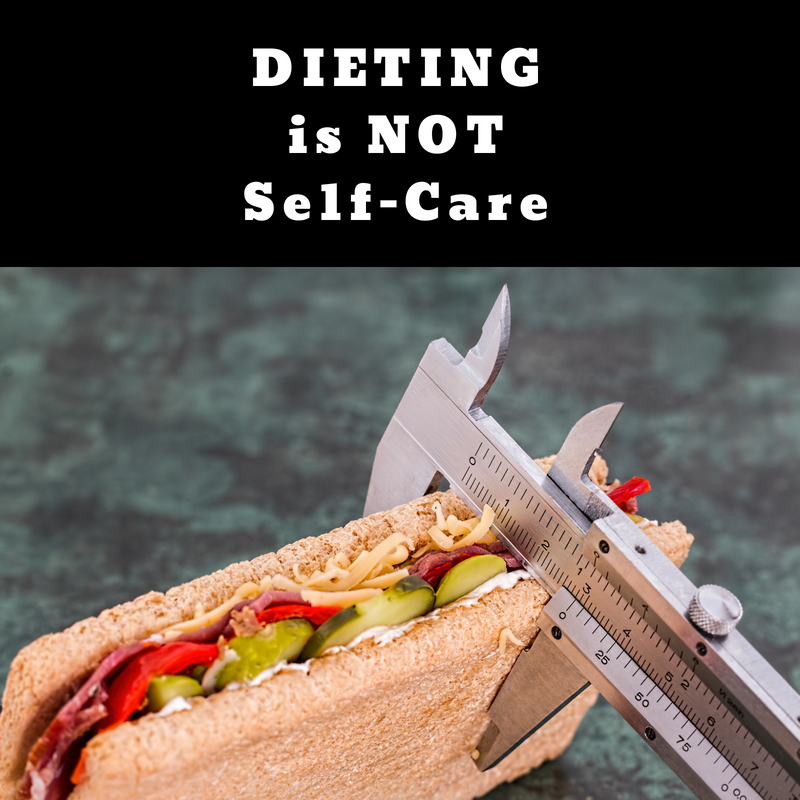 One thing that gets my angry inner goat going like nothing else is the constant insistence out there in the world that dieting to lose weight is the equivalent of “eating healthy” or “becoming healthy.”
One thing that gets my angry inner goat going like nothing else is the constant insistence out there in the world that dieting to lose weight is the equivalent of “eating healthy” or “becoming healthy.”
As a former dieter, and someone who treats long-term chronic dieters and weight-cyclers in my private practice, I can tell you that while this might start out as the intention, it almost never ends that way.
And while some people who do make positive changes in their eating habits may experience some weight loss, there is little evidence that eating “healthier” will absolutely lead to significant long-term weight loss for the majority of people, or turn large people into small people. This is why people tend to resort to diets that involve calorie deprivation to achieve weight loss.
I want to point out, however, that while a nutritionally-dense diet may not lead to weight loss, it can certainly help to improve your health (but is not the whole picture of “health”) and is worth pursuing if that is what you want to do.
But let’s be honest: most diets are not about getting healthier. They are about losing weight, which we are told will automatically make us healthier. Unfortunately, this is not always true.
When I “successfully” dieted for 16 years, at my thinnest and most restrictive point, I ate few fruits and vegetables (“waste of calories”), ignored my hunger for so long I wanted to cry at times, then secretly binged when I couldn’t take it anymore, and ate a mostly monotonous diet of “safe” foods. I fought a psychological war with the scale daily that often resulted in defeat for me, no matter what the number said.
This was not pursuit of health in any way. These were the things I needed to do to maintain weight loss, because simply eating healthfully didn’t.
Many of my clients arrive in my practice with some version of the same story. Their diets may have started as an attempt to eat “healthy” (albeit focused completely on weight as the main measure of health) but they ended up in a never-ending cycle of restriction and binge-eating, feelings of shame around their bodies and failure to follow a diet, and often higher weights than they started at. They are also very confused about how to eat in a way that actually supports health and well-being without feeling deprived (which is why they have come to me).
Let me tell you this: it isn’t that hard to have a balanced, nutritionally adequate diet when you feel relaxed around food. Behavior change can be challenging, but it is much less so when you see body shame for what it is and leave fatphobia behind. That is why dieting isn’t really about health – because diets involve intense shame around your current body and a desire to make it something it isn’t.
When changes feel really hard or unsustainable (and sometimes make you want to cry), consider that you might actually be on a diet. If your diet changes are supposed to produce a tangible change in the appearance of your body, then you are on a diet.
And if you’re worried about health, know that a non-diet approach actually will support making positive changes for health.
In the meantime: This article is a great example of how diseases like diabetes are more likely related to nutritionally inadequate diets than higher weights. It makes so much sense when we look at how long-term yo-yo dieting may be linked to development of diabetes as well as weight gain. Again, “successful” deprivation does not equal health!
Subscribe and get my free guide:
Why you overeat …and what to do about it.
Click here if you just want my newsletter!
Eating
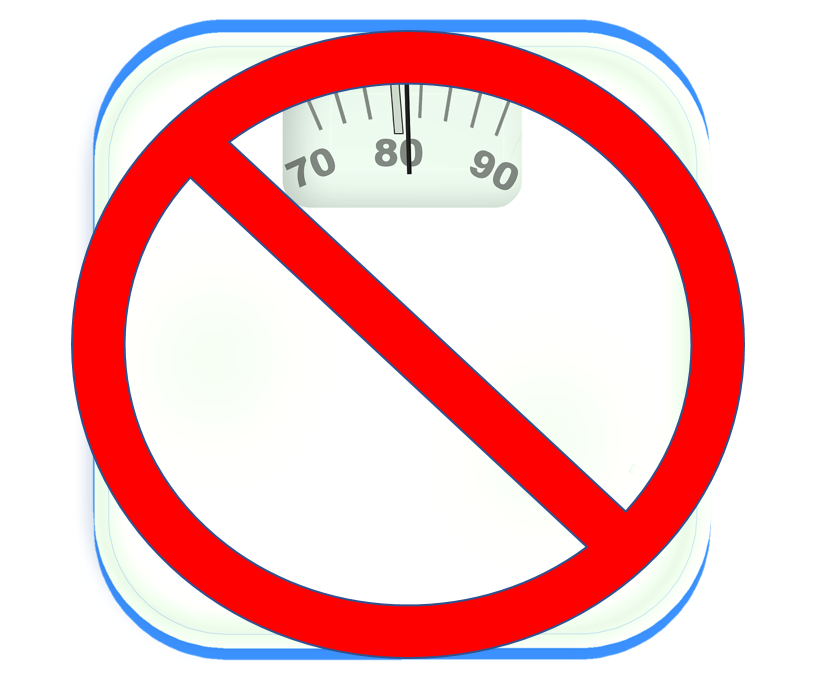 Last month BuzzFeed asked me to contribute to an article called, 13 Experts Explain Why Diets Don’t Work And What To Do Instead and I was all, “Well, okay, yeah, I guess…” Who am I kidding? I nearly climbed through the internet to Sally Tamarkin’s desk to say HELL YES I’LL CONTRIBUTE!
Last month BuzzFeed asked me to contribute to an article called, 13 Experts Explain Why Diets Don’t Work And What To Do Instead and I was all, “Well, okay, yeah, I guess…” Who am I kidding? I nearly climbed through the internet to Sally Tamarkin’s desk to say HELL YES I’LL CONTRIBUTE!
Anyhoo, it’s the new year and I thought this was a great affirmation of why I don’t promote diets and a focus on weight loss. And neither do all the other cool RDs quoted in the article, many of whom I am proud to know personally. They are all doing amazing work, fighting the status quo of the harmful weight loss paradigm.
I hope you’re starting out the new year with resolutions to treat yourself with kindness and compassion, and prioritizing self-care. I wish you a year of relaxed eating and peace with your body.
Subscribe and get my free guide:
Why you overeat …and what to do about it
Click here if you just want my newsletter!
Eating
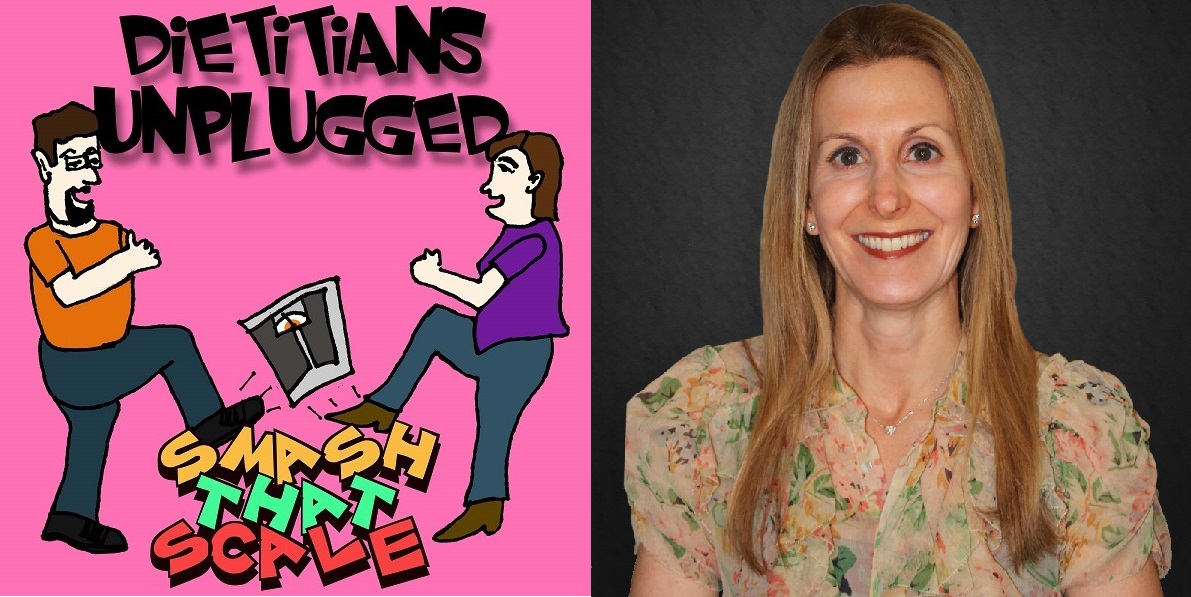
One of the best things about having a podcast is that it’s a great excuse to hang out with your friends and also get to learn from them. That’s why Aaron and I were excited to have our dear friend, registered dietitian and eating disorder expert Robyn Goldberg, on the show recently to talk about progression people take in their recovery from eating disorder to intuitive eating.
Robyn talked about learning to connect with body signals, finding satisfaction with food, the challenges of being in a larger body with an ED, the resistance of health care practitioners to Health at Every Size® and more in this informative episode.
If you are in eating disorder recovery, or know someone who is, we think you’ll find this episode invaluable.
Listen now:
Subscribe and get my free guide:
Why you overeat …and what to do about it
Click here if you just want my newsletter!
